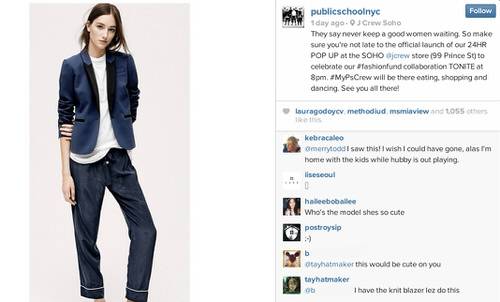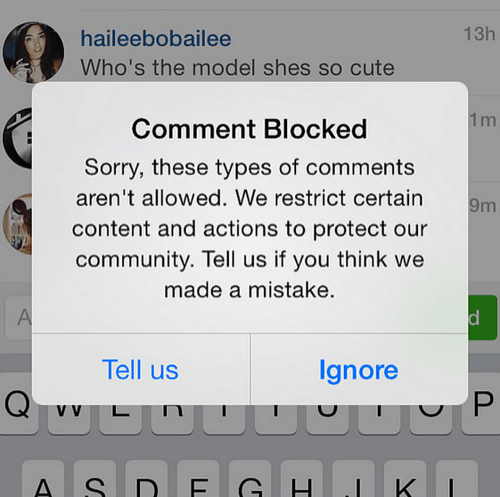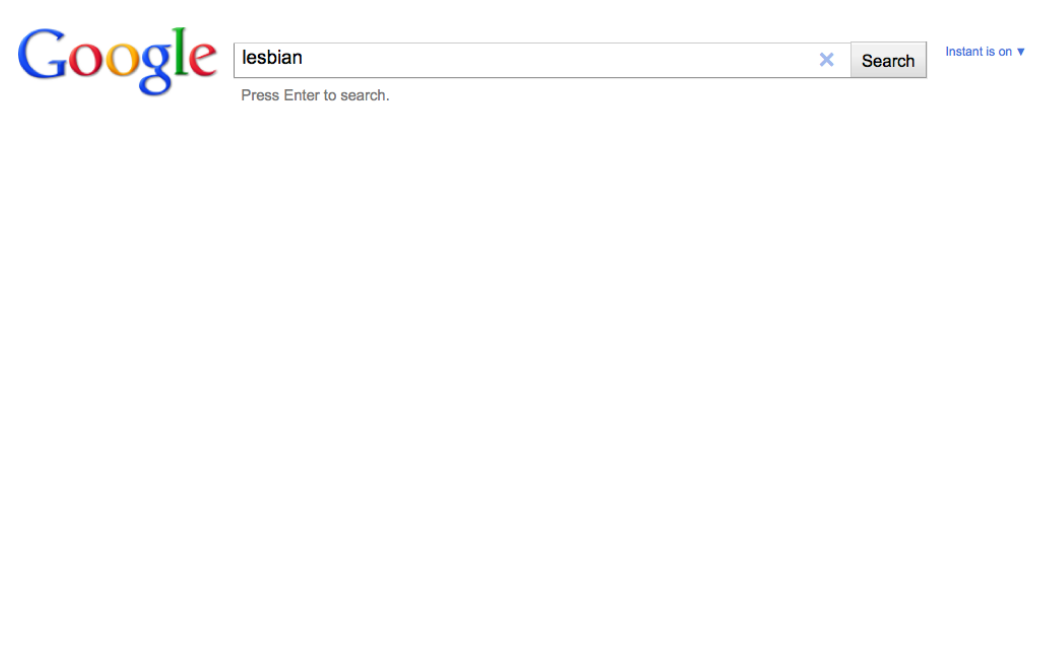[Update: We’ve corrected this story following its initial publication and updated it throughout to reflect information Instagram provided us on Saturday morning. The company says that while it does filter comments for certain banned terms, “lez” is not one of them. Instead, Instagram says its logs show that Hatmaker (inadvertently) @-mentioned herself in the comment, a practice that it blocks on certain accounts to prevent “follow spam.” —ReadWrite senior editor David Hamilton]
Friday morning, like every other morning, I opened Instagram as soon as I woke up. I was met with a notification from my sort-of-ex-girlfriend (it’s complicated). She’d tagged me on a post by New York fashion line Public School to say that a decidedly tomboyish outfit they’d posted would look good on me (it would).

Since I already own a very similar knit blazer, don’t know how to dress myself, and liked the look, I replied “lez do this.” Apparently that’s where it all went wrong.

I was instantly met with a pop-up warning I’d never seen in all my days on Instagram, still my Favorite App Ever.
Confused, I hit ignore. A few tries later, my comment went through and I was left wondering what else triggers this “comment blocked” pop-up in the name of “protecting their community.”
Here are all the reasons—with no more information than that my “content and actions” were deemed worthy of restriction—why I found the Facebook-owned photo-sharing app’s blocking of my incredibly innocent @reply unsettling (albeit hilarious):
- I’ve been an active Instagram user for years and have never run into this message before.
- The comment was a reply from a queer woman (me) to another queer woman.
- Have you seen some of the shit on Instagram?
- The Instagram post was promoting a pop-up shop at J. Crew, a company helmed by the iconic lesbian (and not-lesbian) style icon Jenna Lyons, who is in a relationship with a woman. Irony!
Our team tried to provoke the pop-up censorship warning again with a long series of profanity, gay-ish synonyms and references to the female anatomy, with no luck.
Sure Instagram, next time I’ll hit “tell you” and not “ignore”—but putting the burden on me to explain why my language was acceptable feels pretty absurd, you being under the wing of the biggest social network ever created and all.
After I asked for comment, Instagram told me that it does ban some words, but “lez” is not one of them.
Instead, its logs show I mentioned my own account, @tayhatmaker, the first time I tried to post my reply. On larger accounts, those with tens of thousands of followers, Instagram doesn’t allow “self-mentions,” which are often attempts by users to beg popular users to follow them. I don’t recall doing that, but logs are logs, and it explains why I was able to post my comment on subsequent attempts, and why my colleagues were able to post similar comments in their tests.
I’m relieved to learn that Instagram wasn’t censoring me, and that the concerns I outlined above were misplaced, but I wish its alert had made it clearer what was going on—for example, by explaining that it was not in fact the “content” of my comment that triggered the block, but instead my inadvertent self-mention.
Why Social Censorship Matters To The LGBTQ Community
Here’s some context on why I found Instagram’s pop-up message so alarming, not realizing there was an innocent explanation for it.
In Internet gay lady subculture (and likely tongue-in-cheek queer culture at large), it’s not uncommon to substitute the word “lez” for “let’s” whenever possible—it’s funnier, shorter and gayer, so why not? Approximately zero humans I know actually identify as a “lez” or any similarly silly-sounding variation thereof, but it’s a teensy sliver of the intra-community lexicon. (Facebook, to its credit, offers 56 gender options on its social network.)
Like much language exchanged between marginalized folks, using the word “lez”—just like choosing to identify as “queer”—is a powerful act, reappropriating terms that many of us encountered as weaponized slurs and hatespeech in the past. That’s the gist of why we need to be alert to incidents like this—and make sure there’s not censorship at play.
Right now, social apps like Instagram (Tumblr also springs to mind) are teeming with diverse subcommunities—and that’s unprecedented. Today, anyone can track a resonant identity-based hashtag and discover a thriving current of people like them just beneath the surface.
Growing up gay before the modern social media age, I can’t imagine how much less alone Instagram’s platform of anonymous yet out-in-the-open community would have made me feel—even if it’s mostly selfies.
A Dangerous Precedent
Whether or not Instagram blocked the word “lez” in this case—again, to be clear, the company says it didn’t—it’s not a stranger to awkward, protecting-us-from-ourselves censorship. The company recently apologized after arbitrarily censoring a fat-positive vlogger’s photo of her body, which—as it turns out—wasn’t pornographic at all.
Random, misguided censorship is nothing new for the word “lesbian” either. When Google introduced Google Instant search results back in 2010, a query of the word “lesbian” turned up literally blank. “Bisexual” got the same treatment, whereas “gay”—a term historically more associated with gay men—was a thriving hub of cultural and political results.

Rather than improve the quality of its results (i.e. weed out the porn that tech giants are so afraid of), Google’s bizarre choice at the time not only hindered its users from finding often much-needed—sometimes literally life or death—queer resources, but also damaged the much-needed traffic of the already (and still) “ghettoized” places providing those resources. Hell, even a Google Instant search of “lesbian books” resulted in a void.
Censoring the often encoded language exchanged within social sub-communities repeats a dangerous precedent—not just for the LGBTQ community, but for other disenfranchised groups: namely people of color, women navigating vicious Web harassment—and yes, even body-positive selfie-takers.
By now, given Facebook’s unparalleled resources—and unimaginably huge sample of social data—I’d bet that Instagram, like Google, can come up with a better approach.










